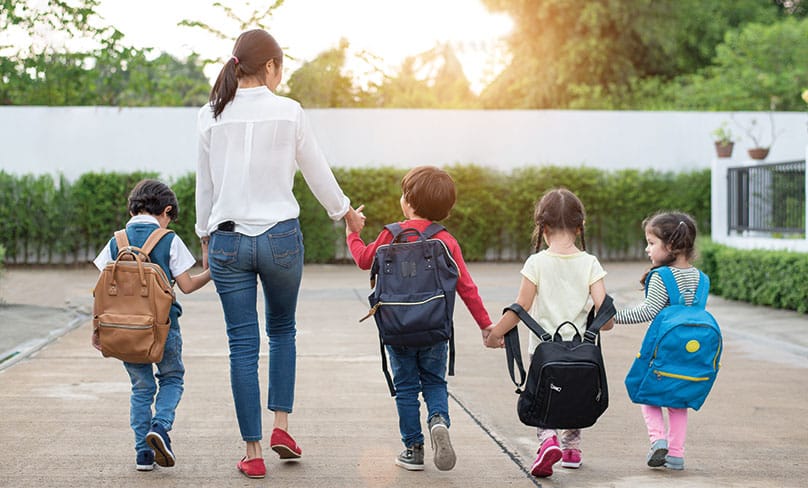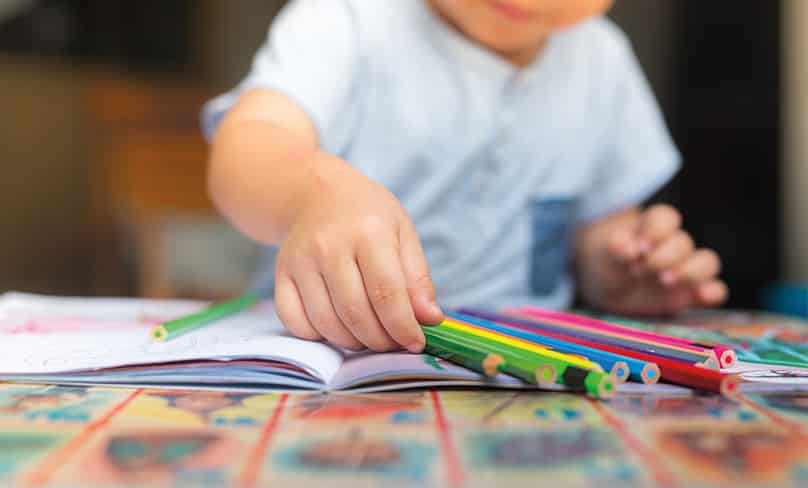
By Mary Ryan
‘Starting school is a watershed moment for families. As a principal you deeply respect the trust that parents have in handing their child over.’
Principal, Sydney Catholic Schools
For 13 years of their life and yours, children attend school. One of the great life gifts we give them is building a relationship with school that is founded upon mutual trust, responsibility and respect. When this relationship is at its best, children benefit. We know that a positive partnership between home and school improves learning, behaviour and wellbeing for children, so it is well worth investing in.
Here are some guidelines for building that relationship.
1. School is a journey
Journeys are always full of joy and challenge and school is no different. During their 13 years of school, there will be times when circumstances or people will challenge them, and that’s okay because they have you. When things are not right, before anything else, talk to your child. What life skills can you help them grow to manage the situation? What are they doing and saying, or what can you encourage them to do or say to manage the situation? Remember, you are their first educator and you are skilling them for life.
2. Think about life learning
Although we don’t want it all the time, adversity is good. When do we begin to learn the resilience we need to cope with adult life? As adults we deal with difficult people at work, we manage big mortgages, face job losses and family conflicts. When did you build the strength and knowledge to navigate life and all that it throws at you? Small adversities at school should be welcomed as opportunities for children to build the resilience needed for a rich and adventurous life. Our instinct is to hold them close and protect them against all, and as babies and toddlers we should. But as they grow and move through school we become less of a protector and more of an advisor. Think about it as holding them when very little, walking beside them as children and then finally we stand behind them as young adults. Resilience is not about facing life alone, but rather knowing who we need to support us through life’s challenging times. A respectful relationship between home and school gives children a number of adult experts to help them learn to navigate life.
3. Know your role and do it well
While we support each other in our roles, the roles of teacher and parent are distinct. Parents as first educators have the very important job of teaching children about values. Growing future adults of compassion and empathy, who act with kindness, justice and in the interest of the common good starts in the home. Catholic schools use the message of the Gospel to support families and underpin these values through the teaching of religious education, social justice activities and a mission to find Jesus in the face of all. Schools have a responsibility to teach children the academics so they may, as adults, fully participate as critical and creative thinkers in our community. Know that the home-school relationship is important to your child and that neither does their job fully without the other. For the sake of our children we need to work together.

4. Preserve the relationship
Work diligently to preserve the relationship, keeping the child at the centre. In 13 years there will definitely be times when the school makes you angry. Something a teacher has done or said, a decision made by a principal, the behaviour of another child will all be factors at play across the years. Go gently. If you are very angry, unless it is a life and death matter, wait. Talk to a confidential person and put time between your reaction and your response. You will not be heard if you go in with guns blazing. If you go to a meeting, ready to listen, maybe with some ideas for a solution, or maybe just to calmly state your case, you are in a better position to sort out the problem and most importantly to use the relationship to your advantage. Schools too need to have a preparedness to hear your concerns and value the relationship in the good times and bad.
5. Support the school
Read notes and newsletters, follow work health and safety protocols, especially at pick up and drop off. Know, use and respect the processes in place to speak to the principal or classroom teacher. Don’t take offence at the gate locking at 9.15am – schools have the duty of care of hundreds of children and they have a legal responsibility to know who is coming and going from the site. The bottom line is it’s about protecting your children.
Speak well of the school and the people in it. Remember, it is the workplace of teachers and they are entitled to the same work health and safety conditions as any other workplace in Australia.
6. You are your child’s advocate
Schools and families should be in it together and if all else fails, you need to speak up. Talk to the teacher, talk to the principal, especially if your child, despite trying everything else, is struggling in some way, or if you feel that the circumstance is extreme. On a similar note, if things change in your family, let the school or teacher know. Part of our role is to support your child in what they may face outside of school. It may be as small as the death of their goldfish or as big as the death of a grandparent – if it matters in their world it needs to matter in ours. We care deeply about your children and want to work with you, with trust, responsibility and most importantly with mutual respect.
Finally, put your child at the centre of the relationship. It cannot be denied that when the child sits central in our adult relationships they feel loved, safe and reassured, no matter what comes their way.
 About Mary Ryan
About Mary Ryan
Mary has been an educator for over 30 years. She has taught in Catholic schools across Sydney and has experience in both school and system leadership. She is currently the Acting Executive Director of the Council of Catholic School Parents and is also working for Catholic Schools NSW supporting schools in the Nationally Consistent Collection of Data. Mary has expertise and an interest in family and community engagement and runs a Facebook page called Teacher at the Gate, bringing teachers to parent conversations to inform, support and build partnerships.
About the Council of Catholic School Parents
The Council of Catholic School Parents (CCSP) is the peak body representing the interests of all Catholic school parents across NSW/ACT and is the largest non-government school parent body in NSW. Established in 1995, CCSP currently represents over 255,000 students and 160,000 families and works to support and advocate for the parents of children in Catholic schools.
